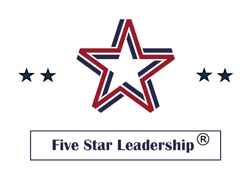Obsessing over OCB is Good
Organizational Citizenship Behavior (OCB) describes actions of an employee where high OCB is evidenced by positive behaviors that are above expected. Low OCB is evidenced by negative, or lack of positive, behaviors that are below expected. For example, an employee with high OCB likely volunteers for committees while an employee with low OCB likely fails to attend required meetings. As its name states, it is how an employee behaves as a citizen of their organization. However, as a leader, it is important to distinguish between the two motivators for the positive behaviors: is the motivation altruistic or self-serving?
Recent research uncovers important employee attributes that affect their motivation, and an enlightened leader will keep these in mind as they develop their relationships with their followers based on follower OCB. Failure to do so can cause organizational dysfunction. The following summarizes Five Star Leadership®'s analysis of WHAT recent research says, WHY it is important to you as a leader, and HOW to use the research for better leadership outcomes.
What they studied. Wingate, Lee, and Bourdage (http://dx.doi.org/10.1037/cbs0000125) studied employees regarding how they exhibited OCB – their behaviors -and related these behaviors to their motivations and a set of personality traits along with leadership styles. The goals were:
- First be able to determine where on a scale of high other-serving (altruism) to high self-serving (impression management) an individual scored.
- Secondly, layer on the political environment of the organization since this affects the degree of motivation for both ends of the scale. If the environment rewards volunteerism, for example, both other and self-serving motivations are higher.
- The third goal was to then correlate the personality traits of Honesty-Humility, Emotionality, Extraversion, Agreeableness, Conscientiousness, and Openness to Experience with motivation.
- The fourth goal applied the previous work to then correlate leadership styles along the dimensions of transformational leadership, transactional leadership, ethical leadership, active management by exception, and contingent reward leadership.
The authors were interested in "Good Soldiers vs. Good Actors." Beats me how they got almost 400 people to answer all the questions needed to address these variables!
Their findings were:
- High OCB is not necessarily evidence of a healthy organization. If individuals volunteer for self-serving reasons and are politically rewarded for doing so, it is likely the work-product is of low quality and will cease when rewards cease, especially transactional rewards.
- Transformational leader foster other-serving OCB, which makes sense as the leader is modeling serving others. As an aside that supports this, the theory of Servant Leadership describes this perfectly.
- Perceptions of favoritism have varied effects on OCB. For individuals who are more motivated by self-serving, currying favor is right in line with favoritism. For those motivated by other-serving, this perception of politics goes against their values and is de-motivating towards positive OCB.
The bottom line is that the context of an organization is important in determining whether other-serving or self-serving motivations for OCB reigns supreme. What type of leadership, what rewards, how relationships are built and maintained, and how leaders model behaviors are critical variables to consider when an organization wants healthy other-serving OCB.
Why this is important. It is this healthy other-motivated OCB that has been found related to important positive organizational outcomes, including increased productivity, lower voluntary turnover, higher workplace safety, and customer satisfaction. As a leader, if you know what you want to ultimately accomplish, you can walk back the process of getting there and implement change to build the steps to that success. Several steps described by this study are:
- Hire employees with the right set of personality traits that support other-serving motivation.
- Develop leaders (including yourself) with leadership skills that develop nascent other-serving motivations in their followers.
- Monitor the political climate in the organization to ensure favoritism and other unfair practices are kept to a minimum.
- Reward through both transactional and transformational actions to recognize positive other-serving OCB.
- Include employees in decisions around what "extra-role activities" they would find enjoyable and worthwhile.
By looking at those steps, you can then decide how to use this information.
How to use this information. There are two functions that must be addressed in order to use this information. The first is management; the second is leadership. To use this information, management must find the need for change important enough to implement data collection and analysis tools to determine employee personalities, the political climate in the organization, the leadership styles in effect, and the reward systems. The context for an organization is built from these four dimensions. Without data collection and analysis over time, there cannot be effective change as there is no starting point and ending point to examine for how interventions such as leadership development courses affected the organization.
Regarding leadership, you, the leader, must look are five characteristics of your leadership style. (See my book "How successful teams work…" at https://amzn.to/2RzgeQm on Amazon for much more information on this.) These five characteristics are leadership behaviors important to developing the right kind of relationship with followers that supports other-serving motivation. You can develop these habits just as you might develop the habit of healthy exercise. Identify where you are, where you want to be, how to get there, and create the goal!So here is what you want to behave like:
- Be other-serving yourself by modeling this for your team. Volunteer out of love of your organization. Be authentic in this and your team will follow.
- Find ways for OCB to be an improvement exercise desired by your team member. For example, if one of your team members wants to learn more about how finance functions in your organization, find a committee that they could join, even as an "observer," that discusses corporate financial issues (building a new facility, buying new equipment, going public…)
- Be sure to reward positive OCB from just "Thanks for the help!" to time-off for time-served.
- Respectfully examine your team member's motivations if they want to volunteer for something. Find out if it is self-serving, which actually isn't evil, and if it is, work with the team member to develop organizational reasons for the volunteer activity. Help develop the altruism in the employee.
- Ask what your team members are interested in. Sometimes you will also be in the position to "volunteer" a team member for a function such as a new committee or an event. Discuss the reasons why with them to ensure that this will not be a relationship destroying request. Negotiate to a win-win.
By reviewing these types of "How to be a leader" activities that create other-serving OCB, you can see that you can change for the better. If you can't, that's ok, but don't expect change in your team members in this respect.
Who Helps and Why? Contextualizing Organizational Citizenship Behavior
Wingate, Timothy G; Lee, Clara S; Bourdage, Joshua S. Canadian Journal of Behavioural Science; Ottawa Vol. 51, Iss. 3, (Jul 2019): 147-158. DOI:10.1037/cbs0000125
Abstract
Employees use organisational citizenship behaviour (OCB) to achieve different functions: some OCB reflects altruistic motivations to help one's organisation or coworkers, and some OCB reflects self-serving impression management motivations. Across 2 samples (Ns = 191 and 189), we contextualize functional (i.e., goal-directed) OCB with respect to dispositional and situational factors. Other-serving OCB was more common among employees higher on Honesty-Humility, Extraversion, Conscientiousness, and Agreeableness, and in workplaces with transformational (intrinsically motivating) leaders and low perceptions of politics. In contrast, all forms of self-serving OCB (i.e., OCB for impression management purposes) were more common among employees low in Honesty-Humility, and some forms of self-serving OCB were more common in more political workplaces (high perceptions of politics). These findings extend the theoretical and practical benefits of a functional approach to OCB, where employees use OCB to achieve different goals-namely, to serve or to receive recognition-within different social and material reward systems.
To unsubscribe, reply to this email with "Unsubscribe" in the subject or at the top of the body.
When you subscribe to the blog, we will send you an e-mail when there are new updates on the site so you wouldn't miss them.


